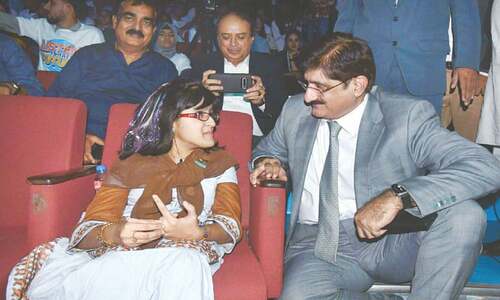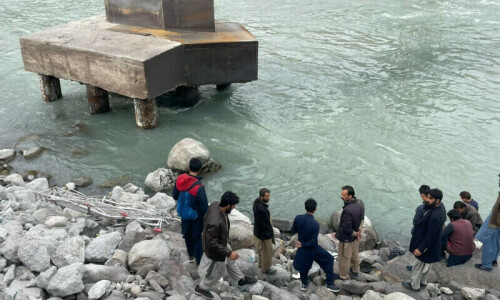KARACHI, April 19: Experts at a conference on Saturday said that respect for law and justice was directly related to the quality of justice being done.
Speaking at the concluding day of the three-day international conference on “Access to Justice: Criminal Justice System”, they said that when justice was provided judiciously and everyone was treated equally, then people would have respect for law.
They said that though it was said that everybody was equal in the eyes of law, the reality was that some people were more equal than others as some people were common and others uncommon.
Justice Tilakawardane Sheerani of Sri Lanka, speaking on “Humanizing criminal justice administration: Are natural rights a myth?” said that though all religions gave the message of love, compassion, peace and tolerance, a lot of violence was carried out in the name of religion, which was exploited by vested interests. She said the people needed to be empowered so that they could see through such propaganda.
She said that enabling environment had to be provided to the weaker sections of society so that their voice was heard and their grievances were redressed. She said that although all kinds of violence was carried out against men and women both, rape was a female-specific offence and needed to be treated differently from other crimes.
Citing an example, she said that during her long judicial career she saw that a large number of people, particularly men, turned up to hear rape case trials, specifically during examination by defence lawyers, who usually asked suggestive questions. She said she also heard audience giggling, which put the victim in a further awkward position, and she could not reply properly. She said she asked the audience if they would still be laughing on hearing such questions if the victim was their mother, wife, sister or daughter. In some cases the victims remained suppressed as the accused was also present in front of them.
She said she decided that only people related to the case would be present in court and the victim would be behind a curtain so that she could not see the perpetrator, said the Sri Lankan supreme court judge and added that enabling environment had to be provided to weaker people to know the truth.
She said she had asked many people, particularly those belonging to the so-called “high society” that if they had a rape in family, would they report it and go for a trial, and their reply was in the negative.
It was because of such social behaviour that prevented victims from coming forward. She said that on the one hand victims needed to be empowered and, on the other, through education, awareness raising exercises needed to be changed.
Former president of the Supreme Court Bar Association Muneer A. Malik, speaking on “Crime and punishment”, said that it was unfortunate that society treated some people as ordinary and others as extraordinary, so when the poor committed a crime, they were punished while the other group got away un-punishment.
He said law enforcement, investigations and laws needed to be reviewed and improved so that the influential did not get away with crime and were punished like their poor counterparts. He suggested that prison conditions needed to be humanized as at present undertrials and hardened criminals and even mentally-challenged inmates were kept in the same barracks. He also demanded that legal aid be provided to all and that support be made available to the victims. On a request of the foreign delegate, Mr Malik, speaking on the lawyers’ movement, said that probably being suppressed for many decades, all segments of society had reached their threshold and reacted when the executive attacked the judiciary. Lawyers, civil society, the masses – including members of the judiciary whose role as an institution, except for a few exceptions, had been far from being ideal in the past 60 years – accepted the challenge posed by the executive.
Through the people’s power and this movement, the dictator was forced to doff his uniform which he called his second skin and now the politicians, who earlier thought that the road to Islamabad went through Washington DC, had come to realize that they could actually form a government by supporting the causes that were dear to the people.
Mr Malik also lauded the role of the media, which had helped spread the movement nationally as well internationally. He said the movement was changing the mindset developed in the past half century.
Barrister Qazi Faez Isa, speaking on “Punishment and deterrence”, said that Gen Zia had formulated some of the laws under the title of Hudood Ordinance which had nothing to do with religion and had been formulated by the dictator to prolong his unconstitutional rule.
He said that under those laws the difference between rape and adultery had been blurred and the laws were widely misused and there were cases in which rape victims had been given punishment of lashes while the rapist had been acquitted as the mandatory four eyewitnesses were not available. He said that some portions of the law had been reviewed and changed. However, still there was a need to review such laws.
Dr Amrita Singh from Delhi said that humanizing the criminal justice system was going to be a long and hard struggle as it was not on the agenda and that there was no political will, and the majority of the few politicians who spoke about it were actually just saying so to get votes from the people. She deplored that even a dialogue on the issue had not been initiated.
She said that every society had its specific conditions and situations, and hence a system needed to be developed while keeping these local sensitivities and requirements in view. She, however, said that people of the subcontinent – Pakistan, India and Bangladesh – shared a common history, heritage etc, and that they should interact with one another more frequently so that they could share and discuss their difficulties and with collective intelligence come to workable solutions.
Retired Justice Nasir Aslam Zahid and others also spoke at the conference where, on the suggestion of the foreign delegates, one-minute silence was observed to pay homage to people who had died or had suffered victimization during the lawyers’ movement for the restoration of the judiciary.










































Dear visitor, the comments section is undergoing an overhaul and will return soon.